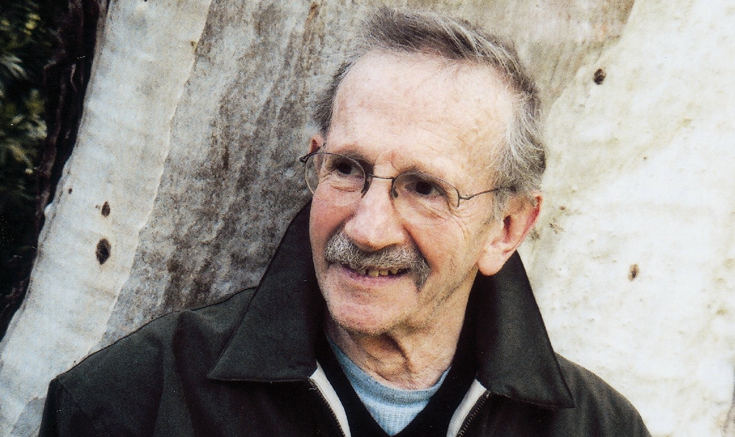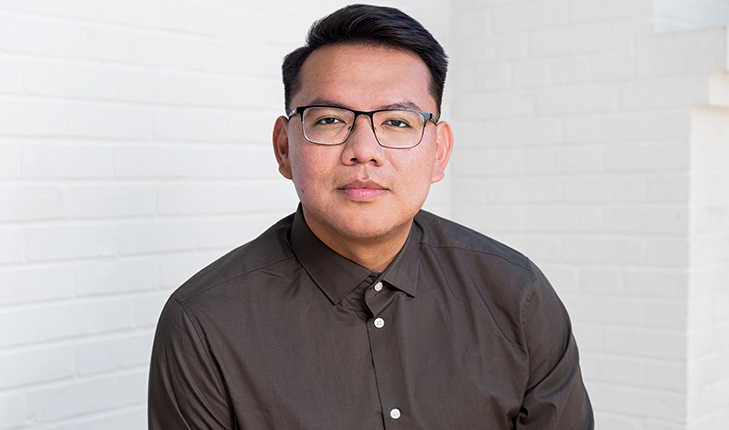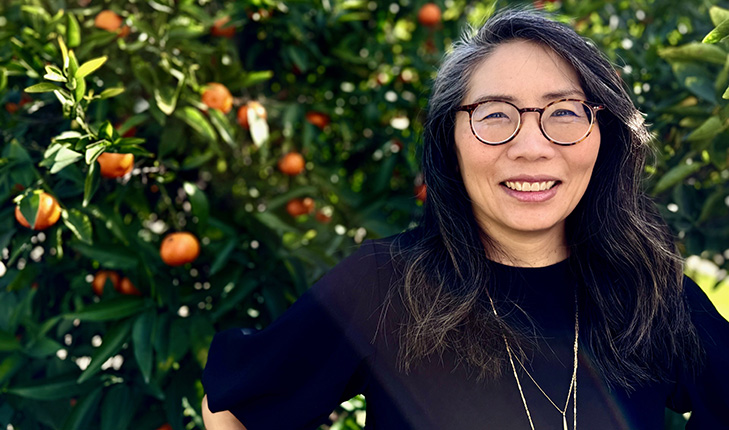Department of English
Philip Levine Prize for Poetry

The Philip Levine Prize for Poetry is an annual book contest sponsored by the Creative Writing Program at California State University, Fresno. This contest -- open to any poet writing in English (except current or former students or faculty of Fresno State) -- offers a $2,000 prize and publication by Black Lawrence Press, a New York-based publisher of contemporary poetry, fiction, and creative nonfiction since 2004.
Current winner: Jia-Rui Cook
About the Contest
Through participation in our Engl 242 course, Literary Editing and Publishing, Master of Fine Arts graduate students are given an opportunity to serve as manuscript readers and staff for the Prize, as well as to learn about other facets of contest administration, book publishing and promotions.
Editorial Assistants for 2025: Peter Garza, Angelina Leaños, Taylor Seals
The contest is named for the late poet Philip Levine, who served as the contest's final judge in 2001, 2002, 2005 and 2013.
Levine was one of the leading poetic voices of his generation, “a large, ironic Walt Whitman of the industrial heartland,” according to poet Edward Hirsch. He is one of the most highly honored and widely read American poets of the 20th Century. Among his many accomplishments:
- He served as poet laureate of the United States from 2011-2012;
- He won the Pulitzer Prize in 1995;
- He won two National Book Awards, in 1980 and 1991;
- He published 16 books of poems, as well as several volumes of translations and two collections of essays;
- He also won two National Book Critics Circle Awards, the American Book Award, the Ruth Lilly Poetry Prize for Distinguished Poetic Achievement, and the Wallace Stevens Award.
Levine and fellow poets and professors Peter Everwine and C. G. Hanzlicek established the Creative Writing Program at Fresno State. He taught here from 1958 to 1992, retiring as a Professor Emeritus of English.
He died Feb. 14, 2015 at the age of 87.
Even after his retirement, Levine remained deeply connected to the Fresno State MFA program for the rest of his life, visiting classes, attending and giving readings, and teaching mini-courses.
The annual Philip Levine Prize for Poetry honors promising new voices in poetry each year, and it actively engages 15-20 graduate students in literary publishing.
The Fresno State Winery produces a limited edition special wine blend called "Picaresque" to honor Levine, with the proceeds benefiting creative writing students through the Philip Levine Scholarship, which was established in 2012 by the College of Arts and Humanities.
The Philip Levine Reading Room inside the Library on campus was opened in May 2017.
Read tributes to Levine on the We Grow Writers blog.
Submit Your Manuscript
Contest opens: July 1, 2025
Deadline: September 30, 2025
Final judge: Jake Skeets
Award: $2,000 prize and publication by Black Lawrence Press; 25 author copies of the published book; and a public reading at California State University, Fresno
Submission Guidelines
Please read the complete guidelines before submitting your manuscript.

Author photo by Deanna Dent
Jake Skeets is the author of Eyes Bottle Dark with a Mouthful of Flowers, winner of the National Poetry Series, American Book Award, Kate Tufts Discovery Award, and Whiting Award.
His work has appeared in journals and magazines such as Poetry, The New York Times Magazine, and The Paris Review. Other honors include an NEA Grant for Arts Projects, a Mellon Projecting All Voices Fellowship, and the 2023-2024 Grisham Writer in Residence at the University of Mississippi.
He is from the Navajo Nation and teaches at the University of Oklahoma.
The Philip Levine Prize for Poetry seeks previously unpublished, full-length poetry manuscripts and is open to any poet writing in English.
Individual poems in a contest manuscript may have been previously published in magazines, journals, anthologies, or chapbooks, but the work as a whole must be unpublished.
Translations are ineligible for this prize, as well as previously self-published books.
Current and former faculty and students of California State University, Fresno are ineligible.
Close friends and family members of the final judge are also ineligible.
Before submitting, please carefully review the guidelines below to ensure that your manuscript is correctly formatted. Double-check your work. Address any errors or mistakes before you submit your manuscript. We are unable able to assist in addressing or fixing errors that occur as a result of failure to review the guidelines. If you make a mistake, you are welcome to make a new submission and withdraw your old submission through Submittable, though you will be charged another $25 entry fee. At this time, we are unable to provide refunds. Please carefully review your manuscript before you submit it.
- Include a title page with manuscript title only.
- Include a table of contents.
- Number your pages.
- Manuscript should be 48 pages minimum and approximately 80 pages maximum.
- Each poem should start on a new page.
- If needed, you may attach a ‘Notes’ page.
- Please do NOT include the following in your manuscript document: a cover letter; a dedication or thank-you page; an acknowledgements page; any biographical notes; your name or any identifying information.
- Do NOT include your name or personal information in the file name or in the title of the manuscript.
- Simultaneous submissions to other publishers or contests are permitted as long as you notify Levine Prize staff promptly if your manuscript is accepted elsewhere.
We are no longer accepting hardcopy manuscripts.
All entries must be certified by Submittable (online) by September 30, 2025.
We are no longer accepting hardcopy manuscripts.
- An entry fee of $25 (U.S.) must accompany each online submission.
- Multiple submissions are accepted so long as a separate entry fee accompanies each submission.
- A limited number of fee waivers to cover the $25 submission fee may be made available on a case-by-case basis. For more information, please email the contest coordinator, Brynn Saito: bsaito@mail.fresnostate.edu
- Do not send fee waiver inquiries until after the contest opens July 1, 2025; deadline to submit a fee waiver request is Sept. 12, 2025.
- Be sure that your document is complete and formatted correctly before uploading.
- Reminder: Do NOT include contact information in the body of your manuscript, in the file name, or in the title of the manuscript.
- Include a title page with manuscript title only and enter your contact information separately into Submittable so that the manuscript remains anonymous.
The Philip Levine Prize for Poetry endorses and abides by the Ethical Guidelines of the Council of Literary Magazines and Presses (CLMP):
CLMP’s community of independent literary publishers believes that ethical contests serve our shared goal: to connect writers and readers by publishing exceptional writing. We believe that intent to act ethically, clarity of guidelines, and transparency of process form the foundation of an ethical contest.
To that end, we agree to:
- Conduct our contests as ethically as possible and to address any unethical behavior on the part of our readers, judges, or editors;
- To provide clear and specific contest guidelines — defining conflict of interest for all parties involved; and
- To make the mechanics of our selection process available to the public.
This Code recognizes that different contest models produce different results, but that each model can be run ethically. We have adopted this Code to reinforce our integrity and dedication as a publishing community and to ensure that our contest contributes to a vibrant literary heritage.
Submittable will provide automated notification of receipt. Please keep this for your records.
Results will be announced in early February 2026. We notify all entrants in two ways:
- via email;
- online via our MFA program’s website, social media, and elsewhere.
Brynn Saito, contest coordinator:
bsaito@mail.fresnostate.edu
Levine Prize staff:
levineprize@mail.fresnostate.edu or 559.278.1569

Jia-Rui Cook
Los Angeles author Jia-Rui Cook won the 2025 Philip Levine Prize for Poetry book contest, which includes a $2,000 award and publication of her debut poetry collection, Soft Beasts, with Black Lawrence Press.
Cook is a Chinese American writer, editor and producer who currently works as a senior communications officer at the California Wellness Foundation. Her poetry recently appeared or is forthcoming in Alta Journal, the Asian American Writers’ Workshop’s The Margins, Electric Literature’s The Commuter, the Missouri Review, Only Poems, Puerto del Sol, SWWIM Every Day, and Women’s Studies Quarterly.
She won the Zócalo Public Square poetry prize in 2013 and is a 2026 Periplus fellow. Cook was once a staff writer at the Los Angeles Times and served as the news events and projects lead at NASA’s Jet Propulsion Laboratory. She grew up in Cherry Hill, New Jersey.
Levine Prize final judge Jake Skeets — a poet, educator, National Poetry Series winner and National Endowment for the Arts grantee — chose Cook’s manuscript as the winner. There were 789 submissions. Skeets wrote of the winning entry:
“Moving through night markets and post-apocalyptic bars, Soft Beasts is both wonder and wander. Its pages hold stark, living images of place: gas stations, oarfish, tulip trees, ‘a throng of frogs.’ I cherish this book for how it teaches us to be alive in the present moment: worrying about old socks, carrying the stories of our families. Cook is an exciting voice in American poetry.”
.
Past Winners
| Year | Winner | Book Title | Final Judge |
|---|---|---|---|
| 2025 | Jia-Rui Cook | Soft Beasts | Jake Skeets |
| 2024 | Amanda Hodes | Into the Into of Earth Itself | Diana Khoi Nguyen |
| 2023 | William Archila | S is For | Douglas Kearney |
| 2022 | Éric Morales-Franceschini | Syndrome | Juan Felipe Herrera |
| 2021 | Maya Pindyck | Impossible Belonging | Carmen Giménez |
| Year | Winner | Book Title | Final Judge |
|---|---|---|---|
| 2020 | E.C. Belli | A Sleep That Is Not Our Sleep | Cathy Park Hong |
| 2019 | Steven Kleinman | Life Cycle of a Bear | C. G. Hanzlicek |
| 2018 | Mark Irwin | Shimmer | C. G. Hanzlicek |
| 2017 | Tina Mozelle Braziel | Known by Salt | C. G. Hanzlicek |
| 2016 | Rachel Rinehart | The Church in the Plains | Peter Everwine |
| 2015 | Andrea Jurjević | Small Crimes | C. G. Hanzlicek |
| 2014 | Christine Poreba | Rough Knowledge | Peter Everwine |
| 2013 | Chelsea Wagenaar | Mercy Spurs the Bone | Philip Levine |
| 2012 | Barbara Brinson Curiel | Mexican Jenny and Other Poems | Cornelius Eady |
| 2011 | Ariana Nadia Nash | Instructions for Preparing Your Skin | Denise Duhamel |
| Year | Winner | Book Title | Final Judge |
|---|---|---|---|
| 2010 | Lory Bedikian | The Book of Lamenting | Brian Turner |
| 2009 | Sarah Wetzel | Bathsheba Transatlantic | Garrett Hongo |
| 2008 | Shane Seely | The Snowbound House | Dorianne Laux |
| 2007 | Neil Aitken | The Lost Country of Sight | C. G. Hanzlicek |
| 2006 | Lynn Aarti Chandhok | The View From Zero Bridge | Corrinne Clegg Hales |
| 2005 | Roxanne Beth Johnson | Jubilee | Philip Levine |
| 2004 | (contest suspended) | ||
| 2003 | (contest suspended) | ||
| 2002 | Steve Gehrke | The Pyramids of Malpighi | Philip Levine |
| 2001 | Fleda Brown | Breathing In, Breathing Out | Philip Levine |
.